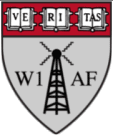|
 Update: This story was posted sometime
around
2009. Since that time, research has been conducted by members of the
Harvard Wireless Club regarding the veracity of the claim. RF Cafe visitor Mr. Fred
Hopengarten, Esq. (K1VR) wrote to apprise me of the situation. It concludes
as follows: Update: This story was posted sometime
around
2009. Since that time, research has been conducted by members of the
Harvard Wireless Club regarding the veracity of the claim. RF Cafe visitor Mr. Fred
Hopengarten, Esq. (K1VR) wrote to apprise me of the situation. It concludes
as follows:
"Back in 1999, the late K3UOC, who received his Ed.D. from the Harvard Graduate
School of Education and was very active with our club, wrote:"
"Note: This legend has been published and told by word-of-mouth countless times
over the past 90 years. Unfortunately, "it isn't so." HWC members researched this
story, even obtaining the copy of the Congressional Record for the date in question.
We could find no record of Mr. Hyman appearing before congress. We have to admit,
though, it's a very entertaining story!"
Also, "We could not find those three guys [Hyman, Almy, and Murray] in our alumni
directory either."
Who am I to argue with members of the Harvard Wireless Club? I stand corrected,
and thanks to Mr. Hopengarten for letting me know. BTW, W1AF apparently nowadays
goes by the name "Harvard College
Wireless Club." Wikipedia now has a page entitled "Etymology of ham
radio," which delves a little deeper into the subject.
Here is my original article:
If you search the Web for the origin of the term "HAM" for radio amateurs, you
will find two or three accounts that are evidently most believed. However, this
version seems to be the most credible. It was provided to me by a very active and
accomplished HAM, Mr. Cornell D., who is not given to propagating bad information.
I tried unsuccessfully to locate an original version of the "Florida Skip Magazine"
from 1959. If anyone has a copy that can provide a scan of the article, it would
be a great service to all HAMs if you could send it to me for posting. Thanks.
All copyrights acknowledged, but unknown.
Why radio amateurs are called "HAMS"
(from Florida Skip Magazine - 1959)
"Have you ever wondered why radio amateurs are called 'HAMS?' Well, it goes like
this: The word 'HAM' as applied to 1908 was the station CALL of the first amateur
wireless stations operated by some amateurs of the Harvard Radio Club. They were
ALBERT S. HYMAN, BOB ALMY and POOGIE MURRAY.
At first they called their station 'HYMAN-ALMY-MURRAY.' Tapping out such a long
name in code soon became tiresome and called for a revision. They changed it to
'HY-AL-MU," using the first two letters of each of their names. Early in 1901 some
confusion resulted between signals from amateur wireless station "HYALMU" and a
Mexican ship named 'HYALMO.' They then decided to use only the first letter of each
name, and the station CALL became 'HAM.'
In the early pioneer days of unregulated radio amateur operators picked their
own frequency and call-letters. Then, as now, some amateurs had better signals than
commercial stations. The resulting interference came to the attention of congressional
committees in Washington and Congress gave much time to proposed legislation designed
to critically limit amateur radio activity. In 1911 ALBERT HYMAN chose the controversial
WIRELESS REGULATION BILL as the topic for his Thesis at Harvard. His instructor
insisted that a copy be sent to Senator DAVID I. WALSH, a member of one of the committees
hearing the Bill. The Senator was so impressed with the thesis is that he asked
HYMAN to appear before the committee. ALBERT HYMAN took the stand and described
how the little station was built and almost cried when he told the crowded committee
room that if the BILL went through that they would have to close down the station
because they could not afford the license fees and all the other requirements which
the BILL imposed on amateur stations.
Congressional debate began on the WIRELESS REGULATION BILL and little station
'HAM' became the symbol for all the little amateur stations in the country crying
to be saved from the menace and greed of the big commercial stations who didn't
want them around. The BILL finally got to the floor of Congress and every speaker
talked about the '...poor little station HAM.' That's how it all started. You will
find the whole story in the Congressional Record.
Nation-wide publicity associated station 'HAM' with amateur radio operators.
From that day to this, and probably until the end of time in radio an amateur is
a 'HAM.' "
Posted May 7, 2021
|
